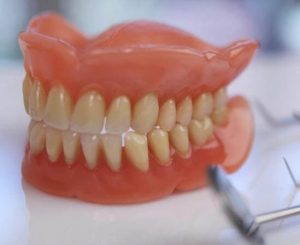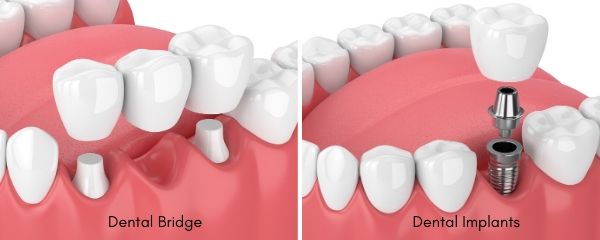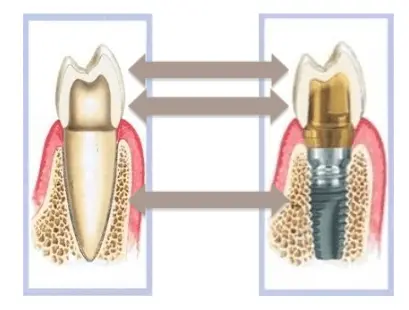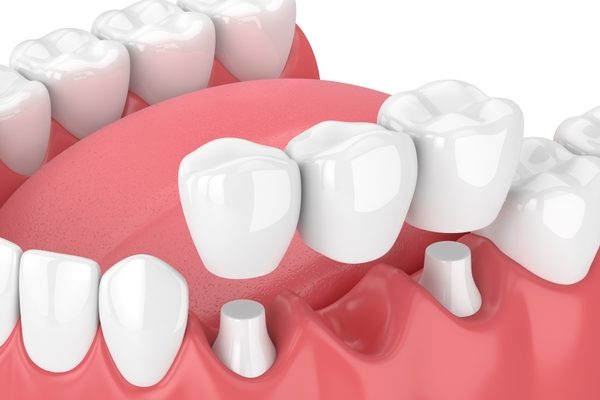As we get older, we can lose our teeth due to tooth decay (caries), gum (periodontal) disease or from teeth fracture. Tooth loss is often due to bacteria and more often than not: Neglect.
However, losing teeth due to old age is a common misconception! We have many patients with intact dentition right up to their 80s.
If unfortunately, your parent has multiple missing teeth, this can lead to loss of function, speech and enjoyment of life.
Tooth loss reduces chewing efficiency. These patients often find eating less enjoyable and tend to swallow food in larger chunks, resulting in higher risk of choking and poor nutrition.
Bone loss (resorption) is often seen with teeth loss. This leads to loss of muscular support, sagging of the face and for some, a loss of self-esteem.

Some older folks live without teeth thinking that this is part and parcel of ageing. This should not be the case and there are many options available to help them enjoy their retirement years.
Options can generally be divided into removable and fixed as listed below:
1. Removable option
- Dentures (Acrylic, Cobalt chrome, Flexible)
2. Fixed options
- Bridge (Fixed Partial Denture)
- Implants
When a dentist consults for replacement options for missing teeth, the patient should be presented with ALL options available to him/her, with the pros and cons properly explained. Costs and length of treatment for each option should also be discussed. After which, the patient can make an informed decision on the most suitable option. Treatment decision is always a two-way process in which the patient plays an active role.
1. Dentures (Removable Option)
Are these archaic and still in use?
It’s a myth that dentures are lousy options that belong to the past.
Properly-made dentures can enhance a patient’s function and the acrylic flanges (pink plastic parts) help prop up sagging cheeks and lips.
A properly made denture requires at least 4–5 visits, is simple to make, non-invasive and inexpensive.
The main disadvantage of dentures would be the lower retention as compared to fixed options, the higher risk of food trap and the need to remove them at night (and sometimes after meals) to clean.
Dentures can be made of acrylic (plastic), cobalt chrome (metal) and nylon (flexible). The choices of materials should be discussed with your dental professional.
Acrylic Dentures
Acrylic dentures are completely plastic. They are slightly thicker to create strength. Main advantage:
- Reparable
- Can be used as a temporary denture during gum treatment if further tooth extraction is expected.
This ensures that the patient is never without teeth.

Cobalt Chrome Dentures
Cobalt chrome dentures are thinner, with reduced risk of plate fracture. They are considered more accurate but cannot be repaired with further tooth loss.

Nylon Dentures (Flexible)
Flexible denture is a good replacement option for 1–2 missing teeth as it completely rests on gum. It might cause gum soreness and is not suitable to replace multiple missing teeth. It has a strong aesthetic advantage as the clasps are in pink (no wires).

2. Dental Bridge (Fixed Partial Denture)
- Quick treatment: Only 2 visits required to deliver a bridge and it is relatively comfortable.
Disadvantages:
- It is invasive as it involves cutting the neighbouring teeth down for 2 crowns to link to the missing tooth/ teeth in the middle (these are known as pontics).

Bridges are stable only up to 2–3 pontics. The neighbouring teeth also have to be in good health. Just imagine the London Bridge—if the span is too wide, the bridge becomes too flexible and the stress at both ends of the bridge might be too great.

This is a dental bridge with 2 crowns and a single pontic (missing tooth). The pontic sits on gum.
This bridge is made of full ceramic. It can also be made of porcelain and metal. Again these choices should be discussed with your dentist.
Is a Bridge Better Than An Implant?

The dental bridge is a permanent restoration that does not need to be removed and allows freedom in chewing all sorts of food. Its main advantage over a dental implant is that the treatment does not require surgery nor a long wait-time for the final restoration.
It is useful in situations where an implant is contraindicated due to the lack of bone volume. That’s because bridge treatment does not require surgery or bone grafting.
The results of a dental bridge are often aesthetic and natural. In the front teeth region, where aesthetics are more crucial, all-ceramic bridges can be used. In fact, in anterior situations where the bone and gums are thin, the dental bridge often gives a higher aesthetic result than an implant restoration, as ceramics can be used to mask ridge deficiencies.
A permanent bridge can be delivered relatively quickly in about 7 to 14 days.
3. Dental Implants

This is also a fixed option but instead of anchoring on neighbouring teeth, we anchor the titanium implant in bone.
Some dentists consider this as the perfect replacement to missing tooth as it’s a one for one replacement i.e. the missing root is replaced by a titanium screw/ fixture
The tooth structure above the gum is replaced with a titanium, gold, or ceramic abutment.
The final restoration is a crown.

Can Tooth Implants Fail?
The survival rates of implants are high, 95–100% over 10-year studies, but these studies are brand specific. When you are considering an implant, do not just ask a clinic “How much is your implant?” Also, ask “Which brand would I be receiving?”
These are important questions as there are thousands of systems in the market. The known and more reliable brands have a history of more than 30 years and they are the ones presenting survival data from their research and have proper quality and infection control during the manufacturing process. You should have the right to know what goes into your jaw!
As with cars, parts are not interchangeable. You cannot put a Honda spare part into a Toyota car. The abutments and abutment screws are system specific. In some situations, where they might loosen or fracture, you would still want your implant system to be in business. A fractured abutment screw that cannot be replaced would render the implant useless and a crown cannot be reinstalled.
Implants will never decay but they are attached to bone and can still suffer from gum disease. So never place an implant in when gum disease is still active. The bacteria can migrate from the tooth to the implant surface and cause an infection.
Maintenance is a shared responsibility between patient and dentist. A good dentist always prescribes maintenance know-how after the treatment and schedules regular reviews. The patient needs to be able to keep to a daily cleaning regime and regular dental visits.
How Painful Is the Process of Getting Dental Implants?
This is the second most common question we get. We are all humans and pain is programmed as our defence mechanism. We always tell our patients that the process is painless as we carefully MANAGE the pain with proper painkillers and numbing agents. For patients who are anxious, IV sedation can be used so that they are asleep during the surgery. Generally, on a pain scale of 1-10, most patients only report a 2 the day after surgery.
Conclusion
We are all made special and individual. The best way to find out which options are most suitable for your parent is to seek the professional consult of a dentist.
Living with missing teeth is never something an elderly has to surrender to.




